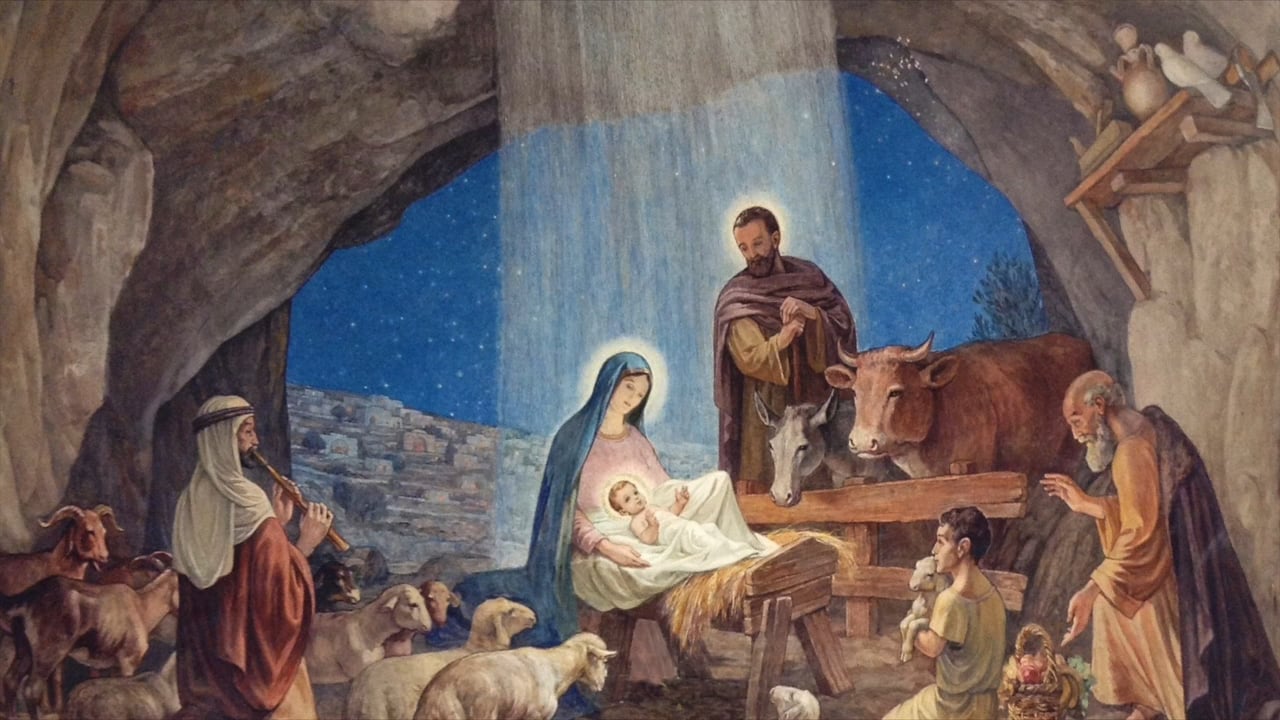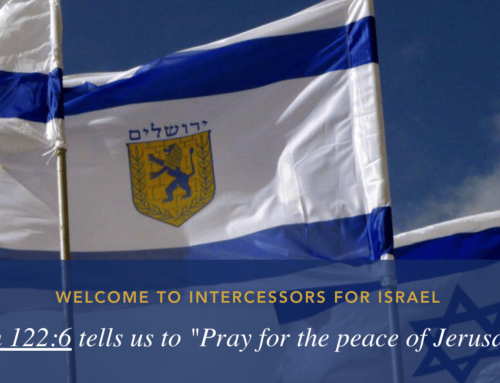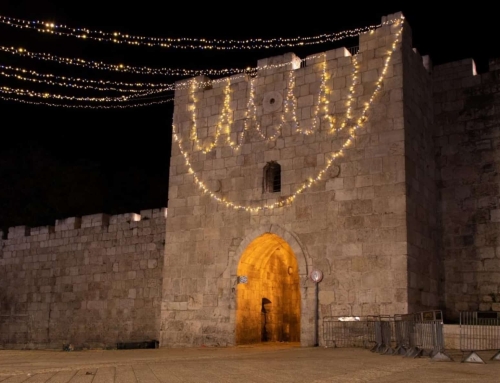By Christine Darg
© The Jerusalem Channel
Should we even be celebrating the Advent of Jesus’s first coming?
Through the centuries some have argued doing away with the observance completely. Oliver Cromwell tried to ban Christmas in Britain after beheading King Charles 1. That attempt didn’t last long.
If the Lord’s birth weren’t an integral part of the Christian faith and annual cycle, why did Matthew and Luke give us so many details about the birth that cause us to celebrate?
Many iconoclasts point to Saturnalia, an ancient Roman festival to honor the god Saturn, as the pagan origins of Christmas. (And there are certain winter pagan elements such as yule logs that I do reject.)
But, for me, celebrating the Lord’s wonderful birth, and the mysterious circumstances surrounding it, isn’t pagan. This is because his origins were heavenly, not pagan.
God’s loving act and the mystery of the Incarnation are the true origins of “Christmas.”
The annunciation in Nazareth, Gabriel instructing Mary to name her son Yehoshua (“YHWH is salvation”), the providential circumstances of the census in Bethlehem, the precious and humble creche scene, the heavenly host in Shepherds’ Fields, Baby Jesus presented in the Temple and Simeon’s sweeping prophecy, the visit of the majestic Magi from the East with gifts of gold, frankincense and myrrh, the Holy Family’s escape into Egypt—all these elements capture my attention and are worthy of adoration and contemplation.
In fact, modern Hebrew’s name for “Christmas” is theologically marvellous: Hag HaMolad, “Holiday of The Birth.”
“Holiday of The Birth” to my mind sets the Lord’s birth apart as UNIQUE, as truly it was!
Based upon certain facts revealed in the Gospel of Luke, it has increasingly become widespread knowledge that Jesus was most likely born in September or October during the Feast of Tabernacles and that his incarnation took place in December during the Festival of Lights, Hanukkah.
As a ministry, for many years, we’ve enjoyed being on the “cutting edge” by celebrating the birth of Jesus during the Feast of Tabernacles in various outreaches and meetings in Bethlehem, specifically in Shepherds’ Fields.
Although the New Testament doesn’t record a specific date for the Lord’s birth, nevertheless, we can work it out almost to the day… by studying clues available in the Bible.
At the time of Jesus’s birth, Luke 2:1 records that in those days Caesar Augustus issued a decree that a census should be taken of the entire Roman world. And so everyone was required to go to their own town to register.
Joseph, Mary’s betrothed husband, had to travel from Nazareth in the Galilee, to Judea, to the city of David, called Bethlehem. This was because Joseph was from the house and lineage of King David, and so Joseph took Mary with him to be registered. And, in God’s providence, it happened that while they were in Bethlehem, Mary’s days of pregnancy were fulfilled.
Scriptures have already informed us that Mary’s pregnancy was not illegitimate– it was entirely supernatural, according to Bible prophecy found in Isaiah 7:14–that a virgin would conceive the Messiah. In those days the Jewish people did believe the Messiah would be the son of God.
The young virgin had been overshadowed by the Holy Spirit, her son was divine, and Mary also did not engage in marital relations with her husband until after the birth of Jesus and after the Jewish purification rites regarding childbirth.
In the Providence of God, Mary gave birth to her firstborn son in Bethlehem. Now, the Scriptures go on to tell us that at this time, shepherds in the region were keeping watch at night over their flocks. This fact meant that it wasn’t wintertime. Suddenly, an angelic host announced to the shepherds the joyous birth of the Saviour, and a specific sign was given… that they would find the baby wrapped in swaddling clothes, lying in a manger.
Why where these things a “sign” of his true identity as the Savior? Because these shepherds were no ordinary shepherds! Sources in Talmudic literature document that the flocks of sheep and cattle raised in the fields around Bethlehem were bred for the very special task of becoming ritual sacrifices in the great temple of Jerusalem just about 5 miles to the north of Bethlehem!
Therefore, these shepherds to whom the angelic host appeared were in charge of a very famous shepherds’ field for temple sacrifices, and according to my research, it was their custom during lambing season to wrap newborn lambs in swaddling clothes to protect them from harm, due to the regulation that a sacrificial lamb must be without blemish. Once the lamb had settled down from the birthing process, the shepherds would remove the swathing materials.
The temple shepherds would have understood the sign – this baby was the Lamb of God born to die for the sins of the world. Therefore, they “came with haste” to find the baby.
The sign of the manger also meant that Mary and the child were either lodged in a cave or in a stable, a booth called in Hebrew a succa,– this was due to the fact that Jews had crowded the area –not only because of the census –but also because of the busy Jewish festival called Sukkoth, the Feast of Tabernacles. Many pilgrims congregated in the environs of Jerusalem, and Bethlehem is just a few miles from Jerusalem. (You don’t realize how close Jerusalem and Bethlehem really are until you visit the Holy Land, and so I enccourage you to come with us on one of our prayer tours!)
In God’s timing and Providence, Jesus– Y’shua is his Hebrew name– wasn’t born in Nazareth or Jerusalem. God arranged circumstances that the Saviour of the world would be born right on time in the little town of Bethlehem, “House of Bread,” and Yeshua is indeed the Bread of Life.
According to Matthew 2: 6, Joseph’s and Mary’s relocation to Bethlehem fulfilled a specific prophecy. The Messiah couldn’t have been born anywhere except Bethlehem!
Micah 5: 2 prophesied, “‘But you, Bethlehem, in the land of Judah, are by no means least among the rulers of Judah; for out of you will come a ruler who will shepherd my people Israel.'” Amen!
Indeed, Jesus is the prophesied Good Shepherd born in a stable, in a succa, in Bethlehem…. amongst sheep and cattle! What a picture! It makes me want to celebrate!
The God of Israel coordinated every detail. In His perfect timing, the Almighty engineered a census and the circumstances for His Son to be born during God’s Appointed Times, his holy festival of Tabernacles.
John the Gospel writer also gives us another clue in John 1:14 that “the Word was made flesh and tabernacled amongst us.”
But there’s more. The New Testament gives us important details about the conception and birth of Jesus’s cousin, John the Baptist, and these details help us to determine the chronological order of Yeshua’s own birth.
No word enters the pages of the Bible by accident! The name Abijah is a major clue!
John the Baptist’s father Zechariah was a priest of the lineage of Aaron who served in the holy temple according to the order of Abijah. While Zechariah was burning incense in the temple, the angel Gabriel appeared to him and informed Zechariah, who was by now an old man, that he and his elderly wife Elizabeth would finally conceive a son, and they were to name him John. In the Book of 1st Chronicles in the Old Testament, the rotation of the temple priests had been set up by King David; there were 24 rotations; the Gospel of Luke tells us that Zechariah belonged to the order of Abijah, and this fact pinpoints the time thereafter of John’s conception.
According to the order of Abijah, the time when Zechariah completed his temple service would have been around the end of June or the beginning of July, and that’s when Elizabeth would have conceived John the Baptist. Next in the chronological order, the Gospel of Luke records that Mary was visited in Nazareth by the angel Gabriel. He announced to her that she would conceive the Saviour by the overshadowing power of the Holy Spirit.
Gabriel gave Mary a surprising word to confirm the validity of his message: her elderly relative Elizabeth, the wife of Zechariah, who had been barren, was now six months pregnant…. for with God nothing shall be impossible!
Now carrying Jesus in her womb, Mary hurried to visit Elizabeth, and as soon as Mary’s voice greeted Elizabeth, John the baptist leaped in his mother’s womb.
Elizabeth greeted Mary with a prophetic word in a loud voice, confirming Mary’s holy pregnancy–that it was indeed from God. (Please note that at this point, neither of the women had shared any intimate conversations; everything spoken was supernatural confirmation.) You can imagine that Mary was tremendously comforted by these circumstances. She stayed with Elizabeth three months before returning to Joseph, to try to explain her pregnancy to him with these affirming signs.
The holy pregnancy was too much for Joseph to believe at this stage. He purposed to put Mary away quietly. However, Joseph was given a supernatural dream in which he was assured that her baby was indeed conceived by the Holy Spirit and that he, Joseph, was to name the child Jesus (Yeshua in Hebrew), meaning, “YHWH is salvation.”
Now, John the Baptist, the forerunner of the Messiah, was born the week of Passover. That’s significant because John came in the spirit and power of Elijah. There’s an empty seat at every Passover table to welcome Elijah!
At John’s birth, Mary would have been three months pregnant.
Therefore, if you count back three months from Passover, that means Yeshua was conceived—not born—but incarnated in Mary’s womb on approximatley December 25. If anything, on this date we can certainly celebrate the coming into this world of the Light of the world! And it just so happens that December is the time of the Jewish festival of Hannukah, the festival of the temple’s rededication, also called the Festival of Lights. Yeshua IS the light of the world!
Although Hanukkah is not a Levitical festival, nevertheless it is given an honorable mention in the New Tesament in John Chapter 10. Verses 22 and 23 record, “it was at Jerusalem the feast of the dedication, and it was winter. And Jesus walked in the temple in Solomon’s porch.” That calls for a Selah moment!
So now, if we count 40 weeks, or nine months’ gestation, from his conception on approximately December 25, that brings us to the fifteenth day of the seventh month of Tishri on the Hebrew calendar. That’s the first day of the Feast of Tabernacles, called Sukkot. Scholars say it’s very likely that Jesus would have been born on the first day of the Feast of Tabernacles, and therefore he would have been circumcised on the eighth day of Succot, the day called Simhat Torah, meaning, “the rejoicing over the Law.” This is because Yeshua IS the Torah; he IS the Word of God!
Let’s consider how Jesus fulfilled the festivals of the Lord as outlined in Leviticus. Jesus fulfilled Passover when he died as the Lamb of God; he fulfilled the Festival of First Fruits when he was raised from the dead; he fulfilled the Festival of Weeks, or Shavuot in Hebrew, and known in Christian circles as Pentecost, when he sent the Holy Spirit upon the church, and he partially fulfilled the Feast of Tabernacles by being born at that time. But at his Second Soming, the Lord will make a greater fulfillment of the Feast of Tabernacles when he dwells in David’s restored Tabernacle in Jerusalem. The week-long Feast of Tabernacles occurs in either September or October on the gentile Gregorian calendar – approximately three months before the holiday that we call “Christmas!”
Now, having explained all of this, Christmas has evolved into a church tradition and a family time. But before you start to cast stones, let’s consider an important instruction given by the Apostle Paul in Colossians 2: 16:
“Do not let anyone judge you by what you eat or drink, or with regard to a religious festival, or a Sabbath day.” Colossians 2:16 is such an important verse to hang onto when people start to bully you because you worship the Lord on a Sunday instead of a Saturday, or if you eat non-kosher food, or if you celebrate the Lord’s birth on a certain date, and so forth.
Make a note of and remember Colossians 2: 16, “Don’t let anybody judge you on matters or food and drink, or with regard to a religious festival…. “and so forth. Paul assures us of the liberty we have in Messiah, and so we can celebrate the Lord’s birth any time, really.
I like “The Message” version of Colossians 2: 16 to 17:
“So don’t put up with anyone pressuring you in details of diet, worship services, or holy days. All those things are mere shadows cast before what was to come; the substance is Christ……”
But you might ask…. what about Santa Claus? Although St. Nicholas was an historical figure with a reputation for secret gift-giving, the “Santa Claus” and Father Christmas narratives are, in my estimation, a lie.
Most of us recognize that lying is a sin.
I’m grateful that I was brought up in a godly home by Bible-believing parents who didn’t lie to us about Santa Claus. They rightfully said Santa was make-believe. My parents joked that Santa brought gifts for good children, and left bags of switches for bad children. When we read the poem, “The Night before Christmas,” I knew it was just a children’s story. My parents refused to teach us a lie. They didn’t want us to discover that Santa wasn’t a real person and then perhaps doubt that Jesus was real.
Through the years in our ministry we’ve made good use of Christmas celebrations as opportunities to share the Gospel with folks who might otherwise not give us a hearing. It’s also a time to reach out to the poor and needy. We’ve held many Gospel outreaches at Christmastime even in Bethlehem, during the Orthodox Christmas holiday, when we take tour groups to the Holy Land.
From Lamb to Lion!
Whenever we focus on a manger scene, we have to be careful not to miss the bigger picture. Jesus is coming the second time, not as a meek and mild lamb but as the roaring lion of the tribe of Judah! In the Book of Revelation we’re permitted to see the high court of heaven, and in Revelation 5: 5 Jesus is called the lion of the tribe of Judah.The first time Jesus came: his glory and majesty were veiled in the form of a child. Only a few attended His arrival. He came as a sacrificial lamb. But make no mistake about it, the next time Jesus comes, He will be recognized by all. The Bible says every eye will behold Him and every knee will bow. If there were wonders when Messiah first came, there will be greater wonders when He comes the second time!
During this holiday season, I encourage you to marvel at the incarnation of Messiah in the virgin’s womb but also remember that He’s alive and he’s getting ready to return.
If we preach only the Lord’s first coming, we’re not telling the full story!
What was the purpose of the Lord’s first coming? He “was once offered to bear the sins of many.” (Hebrews 9: 28) This is the foundation of the Gospel. Messiah died for our sins, according to the Scriptures. God’s holy law has been violated by humans. Death is required as a penalty. But the Messiah died in our stead. That’s the doctrine of the Atonement. Benjamin Franklin once said, “There’s nothing certain but death and taxes.” But there’s one thing even more certain—and that’s the Second Coming. It’s a sure thing, folks! Are you ready?
God’s Word says, “For the Lord himself will descend from heaven with a cry of command, with the voice of an archangel, and with the sound of the trumpet of God. And the dead in Christ will rise first. Then we who are alive, who are left, will be caught up together with them in the clouds to meet the Lord in the air, and so we will always be with the Lord.” He will gather those of us who wait for him unto salvation. His promise in John 14 was, “if I go away and prepare a place for you, I will come again to receive you unto myself, that where I am you may be also.”
Another purpose of the Lord’s Second Coming will be to restore the Kingdom to Israel! On the one hand, we need to see Jesus crucified for our sins, dead and buried and raised from the dead according to the Scriptures; but we also must see Jesus coming again, and coming soon, as conquering king to rule this world in peace and righteousness from the throne of his father David.
For those who don’t know the Lord and who are not ready for his return, the thought of the Second Coming can be scary. If you’re fearful, ask the Lord to manifest himself to you because he is alive! The first disciples believed in the resurrection, not because they couldn’t find a dead body, but because they encountered a living, resurrected Jesus!
As a faithful witness of the Lord’s empty tomb in Jerusalem, I proclaim Jesus…. raised from the dead and ascended to the right hand of God the Father. If we look in Bethlehem’s manger and see only a Baby and we don’t see the Coming King of Kings and Lord or Lords, our vision is impaired. We’re seeing only a part of the picture that the Bible teaches — the baby in the manger is a very important part of the picture, because God become flesh and dwelt amongst us, but the baby in the manger is not the final picture.
Lately in my talks, I’ve been reminding people of the question that the disciples put to Jesus just before the Lord ascended back to heaven. In Acts 1, the disciples asked him, “Lord, will you at this time restore the Davidic kingdom to Israel?” His answer startled them. He said that before he returns and sets up rule in Jerusalem, FIRST his disciples must preach the Gospel to all nations! We’re doing our part; every time we preach in the nations, and people get saved, we hasten the Lord’s return by helping to complete the fullness of the Gentiles.
YOU can also hasten the Lord’s return by surrendering to him and giving your life to him. There’s a Christmas carol called “I’ll Give him my heart:
What can I give Him poor as I am
If I were a shepherd, I would bring Him a Lamb
If I were a wise man, I’d sure do my part
So what can I give Him? I’ll give Him my heart!
I invite you to do that now. Today is the day of salvation, not tomorrow, but today, right now. Will you dare to confess with me before the throne of God, “Heavenly Father, I do believe in my heart that you raised Jesus from the dead, and I’m willing to confess with my mouth that Jesus is Lord.” Amen! The Bible promises that all who call upon the name of the Lord shall be saved!








Leave A Comment